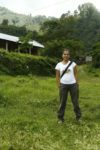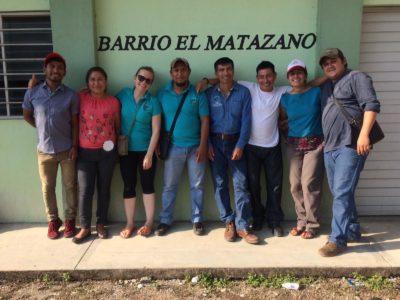A Word From the Field with Alejandra Guzman Luna
Alejandra grew up in a rural area south of Mexico City and works at the Community Agroecology Network staff as project manager for CAN’s work in Mexico.
The Community Agroecology Network, alongside cooperative partners CESMACH and PRODECOOP, and university partners from University of Vermont, Santa Clara University, Universidad Nacional Agraria, and El Colegio de la Frontera Sur,, have spent the past three years working together on a participatory action research project called: Assessing diversification strategies in smallholder coffee systems in Nicaragua and Mexico.
In November of 2018, with help from a Grow Ahead crowdfunding campaign, the project’s 1st cross-site research and learning exchange, or Intercambio, took place in Nicaragua. Mexican farmers, cooperative leaders, university researchers, students and youth traveled to Nicaragua to visit farmers’ fields, share each other’s diversification activities and dialogue about what has and hasn’t worked.
In August, the 2nd Farmer-to-Farmer Exchange will happen in Chiapas, Mexico, bringing Nicaraguans to Mexico to analyze 3 years of research results together, learn about integrating honey bees into coffee forests and develop tools for cooperatives and coffee farmers to guide decision-making about diversification activities. Grow Ahead has launched a campaign to fund the second intercambio.
A Word From the Field

Alejandra in the community Zapata
Hello my name is Alejandra Guzma Luna and I am a part of the Community Agroecology Network. I attended the 2018 exchange in Nicaragua. The most impactful part of the exchange was understanding the experiences of diversification in real life during farm visits, particularly that of Don Alvaro. I was impressed at his capacity to experiment and the creativity that he has to always be experimenting with new ways to protect his milpa (parcel of corn and beans). For example, how to protect the new coffee plants from defoliating ants. Don Alvaro, in a really simple but intelligent way, covered the coffee plants with plastic bottles so that the ants couldn’t climb up and eat the leaves.
Also, how the practices of diversification have an impact, not just in the family of producers, but also on a community level. Don Alvaro was breeding chickens. He bought them from a farm but raised them organically and free range, like a rancher, so the quality of the meat is very high without hormones or issues common with raising chickens. He sells them to his neighbors and the families in his community, which brings economic benefits to Don Alvaro’s family and access to higher quality meat in the community.
I was impressed that the impact can extend to not just the family but also on a community level, including on an economic level. That really impressed me and left me inspired. Something that we are trying to put into practice here in Mexico is this practice of experimental producers and we returned from the first exchange with a clear vision and now it is something that we are trying to incorporate.
We are incorporating this with the 50 families in the second phase of the project, the families that we work with. Right now they are experimental producers that are implementing different diversification projects which they decided on. It’s cool because the 5 facilitators that we are working with are young, producers, and rural farmers. They are the ones who work most closely with the 10 families. We have meetings and trainings about diversification activities, but in reality it is not a vertical training where the facilitators are just giving information to the experimental producers. Really it is an exchange of experiences. The experimental producers talk and show their experiences and their knowledge in certain diversification activities and then the farmers return to their land and put those diversification techniques into practice.

Alejandra with the equipo de facilitadores and Janica Anderzen after the Feria de la milpa
They take notebooks to write down questions and record the points of the experiment, experiments that they design around food, treating illnesses, animal, planting techniques, and how to solve some of the problems that every producer has. Every producer has a distinct way to solve these classic problems, so they come back to the meeting and share their knowledge. They return to their communities to experiment with these tactics and their homework is to come back and share their experiences with their colleagues and partners.
We try to put into practice the phrase that says ‘We all know something and no one knows everything’. We keep this in mind and try to have everyone share the knowledge that they have. I think that this is very encouraging. We continue to encourage that within our community, it is something that we brought to the past exchange in Nicaragua and we want to share this sentiment with our colleagues when they come to Mexico. We hope that they will share their knowledge and then we can compare experiences because there are always different results different contexts. We want to see how our colleagues in Nicaragua go about talking about their experiences so we can learn from them, with the particulars of each of our systems and places, so that we can all be inspired to diversify our coffee systems.